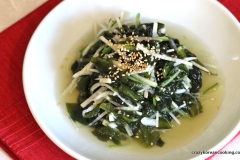Sea Mustard (Miyeok or Brown Seaweed) 미역
Miyeok is edible sea vegetable, widely enjoyed by Koreans in soup, cold soup, salad, side dishes, pancakes etc. Miyeok's scientific name is Undaria pinnatifida. In English, it can be called sea mustard and "Wakame" in Japanese. It is known that Koreans started to consume miyeok in Goryeo Dynasty (936 -1392 AD).
Miyeok is considered to be one of the super foods even in North America even though it's not in normal american diet. It is a great source of Calcium, Iodine, Fibre, Omega acids, Vitamin B1 & B3 while low in calorie. Its health benefit is infinite: metabolism regulation, blood purification, constipation relief, detoxification, anti-carcinogen, anti-aging etc. For this reason, Korean women eat Miyeokguk (seaweed soup) after giving birth. They say this tradition started in Goryeo Dynasty when people observed whales eating miyeok after giving birth (believe it or not).
Koreans use miyeok and other types of seaweed to make their own natural facial mask as well.
In Joseon Dynasty (korea between 1392-1897), miyeok was considered to be so valuable that Kings rewarded his loyal court officials with miyeok.
Miyeok is also very sustainable. It doesn't require extra energy or fertilizer to farm. They say ocean farms are more sustainable than even the most environmentally sensitive land farms.
So, will you try this amazing sea plant?
You can buy Sea mustard (miyeok or brown seaweed) online here.
Sourcing & Selecting
Local Korean grocery market
At CrazyKoreanShopping.com
You can buy Sea mustard (miyeok or brown seaweed) online here.
Dried Miyeok: Seal and keep in the refrigerator or keep in cool and dry place away from direct sunlight (10ºC ~ 15ºC).
Fresh Miyeok: Rub with salt, rinse, blanch, drain, seal and freeze.
For 100 g of Miyeok
Proximates
Water g 79.99
Energy kcal 45
Protein g 3.03
Total lipid (fat) g 0.64
Carbohydrate, by difference g 9.14
Fiber, total dietary g 0.5
Sugars, total g 0.65
Minerals
Calcium, Ca mg 150
Iron, Fe mg 2.18
Magnesium, Mg mg 107
Phosphorus, P mg 80
Potassium, K mg 50
Sodium, Na mg 872
Zinc, Zn mg 0.38
Vitamins
Vitamin C, total ascorbic acid mg 3.0
Thiamin mg 0.060
Riboflavin mg 0.230
Niacin mg 1.600
Vitamin B-6 mg 0.002
Folate, DFE µg 196
Vitamin A, RAE µg 18
Vitamin A, IU IU 360
Vitamin E (alpha-tocopherol) mg 1.00
Vitamin K (phylloquinone) µg 5.3
Lipids
Fatty acids, total saturated g 0.130
Fatty acids, total monounsaturated g 0.058
Fatty acids, total polyunsaturated g 0.218
Source: National Agricultural Library
http://ndb.nal.usda.gov













